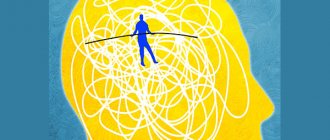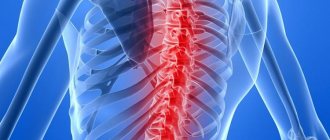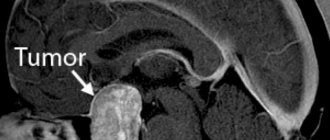Medical information is reliable Checked by Shaidullin Renat Flyurovich
Schizophrenia is a mental disorder characterized by disturbances in the emotional-volitional sphere and pathology of thought processes. Officially included in the international classification of diseases ICD-10 under the label F-20. It affects people regardless of age, gender and social status. In men it appears at an earlier age (18-25 years), while in women it first develops between 26 and 45 years.
During periods of exacerbation, a sick person must be under the supervision of a specialist. In this case, he will be provided with assistance to overcome the crisis in the most delicate manner. We provide anonymous support and keep the information of the patient and his relatives confidential.
Signs of schizophrenia
Official medicine finds it difficult to determine the exact causes that cause the development of schizophrenia. Long-term study of the mechanisms of the disease has not made it possible to identify specific stimuli for the deterioration of mental health. Somatic manifestations of the disease in childhood, adulthood and adolescence have significant differences. Therefore, a final diagnosis is possible only during the onset of puberty.
Among the most likely prerequisites for the development of a mental disorder, there are several main ones.
- Genetic predisposition.
The disease can be inherited from a close relative; approximately 10% of children in adolescence are diagnosed with this diagnosis if their mother or father has it.
- Hormonal dysfunction.
Schizophrenia is associated with impaired dopamine production. This hormone is a neurotransmitter that is responsible for the state of a person’s emotional sphere. If there is a pathology of the central nervous system, dopamine is produced in excess. At the physiological level, this causes intense mental overexcitation, in which a person constantly remains. The result is delusions, paranoid ideas, obsession, psychosis or hallucinations.
- The impact of viruses on the human body.
There is a category of pathogenic microorganisms that can destroy nerve cells. One of the most known pathological agents to science is the herpes virus. With good immunity, it can stay in the body for years without causing harm. If the patient suffers from various diseases of a chronic or infectious nature, viruses can manifest themselves, causing the manifestation of schizophrenia.
- Toxoplasmosis.
This is an indirect cause of the development of schizophrenia, but rather one of the risk factors. It is especially dangerous if a pregnant woman is infected: the fetus can develop pathologies, including diseases of the nervous system.
Common causes of schizophrenia include:
- alcohol, drug and other types of addiction;
- pathologies of intrauterine development;
- brain injuries that occurred during childbirth or throughout life;
- heredity;
- severe emotional shock;
- prolonged stay in a state of stress, prolonged depression.
Scientists believe that specific family attitudes are also the trigger for the development of the disease. Parents force the child to react to certain situations according to one scenario, while they themselves perform completely different actions. The dualistic attitude cannot be analyzed by a small child due to his age. Contradictions grow inside him, with which he is left alone. The constant search for answers to one's questions causes intrapersonal conflict, which over time can develop into a mental disorder.
Causes of mental illness
The exact cause of schizophrenia has not yet been identified. It is believed that this is a multifactorial disease that develops under the influence of a number of provoking and predisposing factors:
- Burdened heredity. If you have close relatives with schizophrenia, the risk of developing it in your offspring increases by about 20 times.
- Unfavorable social conditions such as poverty and family instability.
- Bad habits. Smoking, drug addiction, substance abuse and alcoholism do not so much cause the disease as accompany schizophrenia, complicating its course.
- Complicated pregnancy (prematurity, intrauterine hypoxia or infections).
- Emotional turmoil, especially in childhood. It has been proven that people who have experienced physical or sexual violence are more likely to develop schizophrenia.
- Anomalies in the development of central nervous system structures. Autopsies of dead patients showed that most of them had dilation of the cerebral ventricles, a decrease in the volume of the frontal lobe, and organic changes in the temporal gyri and hippocampus.
There are other theories of the development of schizophrenia that are not so popular and widespread.
Prerequisites for the development of schizophrenia in childhood
The psyche of a small child is very vulnerable; his condition and mood largely depend on the people around him and the events taking place around him. The psychological perception of reality is established at an early age. If a deviation of the schizoid type is observed, doctors do not undertake to make a definitive diagnosis; they recommend waiting until adolescence.
The tendency to the disease in preschool age manifests itself specifically:
- the child is considered strange - he reacts inappropriately to events;
- often experiences unreasonable fear;
- becomes overly irritable and impulsive;
- when observing him, increased nervous excitability appears;
- bouts of crying that occur for no particular reason can last a long time;
- the child often moves from euphoria to apathy;
- he talks about his visions, hallucinations;
- the teenager is bothered by obsessive thoughts, he gets fixated on the same idea.
If there are several such negative manifestations, there is reason to think about visiting a psychiatrist. Deviations may be accompanied by personality degradation, which will fully manifest itself in adolescence. This may include dissatisfaction with appearance, delusions and hallucinations, motor dysfunction, suicidal thoughts and attempts to die.
Diagnostics
Schizophrenia has a wide variety of forms, so very often experts use the name of this disorder in the plural. The main symptoms, such as delusions and hallucinations, can also occur in other pathological conditions. Therefore, during diagnosis, it is very important to differentiate schizophrenia from other disorders.
To make a diagnosis, a psychiatrist uses the following methods:
1. Clinical and anamnestic examination . This examination is carried out at the first appointment. The doctor listens to the patient's complaints and examines him. Of great importance is not only the person’s condition at the moment, but also what happened to him before the onset of the disease.
Despite the fact that schizophrenia develops due to a disruption in the relationship between nerve cells, external factors (maternal pregnancy, trauma, conflicts, stress, infectious diseases, etc.) can negatively affect the course of the disease and interfere with recovery;
2. Pathopsychological examination . This diagnostic technique includes a series of tests relating to the emotional and volitional sphere of a person. The most famous is the ink blot test (Rorschach test), during which the patient is presented with 10 cards with color and black and white blots.
The Luscher test is also effective in diagnosing schizophrenia. It is based on the doctrine that a person’s perception of color depends on his psycho-emotional state.
These and other techniques allow you to assess the “unusuality” of a schizophrenic’s thinking. The fact is that the brain of a healthy and a sick person works differently. A person suffering from schizophrenia can see a whole story in a simple spot, whereas for an ordinary person it will remain a spot.
During psychological research, collections of questions are used. For example, a doctor might ask what a felt-tip pen and a boot have in common. A healthy person would be perplexed by such a question, but a schizophrenic would give the answer immediately. Such creativity in judgment is due to illness, not genius, although many brilliant people are often called crazy;
3. Neurotest and Neurophysiological test system (NTS) . In a laboratory setting, a capillary blood test (neurotest) can be performed, which helps confirm the diagnosis in doubtful cases. Thanks to it, certain markers of inflammation are detected in the blood, their number is directly proportional to the severity of the patient’s disease.
The neurophysiological test system is a modern diagnostic technique in psychiatry. During its implementation, a person’s reaction to external stimuli (light and sound) is assessed. With the help of NTS, you can accurately determine whether a person has schizophrenia or not. The use of EEG and MRI devices in these cases will be useless.
Only after a comprehensive diagnosis, a thorough examination and in full compliance with international criteria can a person be diagnosed with schizophrenia. In many cases, this requires a consultation with the participation of doctors of science and doctors of the highest category.
Schizophrenia symptoms
The signs of the disease are clearly indicated by doctors. All symptoms of schizophrenia are divided into 4 large groups:
- positive;
- negative;
- disorganized;
- affective.
Positive symptoms
Positive signs of schizophrenia were not previously inherent in the patient, are not specific traits of his character, and arise exclusively against the background of the disease. The term “positive” implies the emergence of new qualities, in this case it is not used as “good”. This group of symptoms includes:
- inappropriate reactions to people and events;
- constantly excited state;
- delusions, illusions, hallucinations.
Inappropriate behavior is expressed in the form of stupid actions, excessive nervousness, inconsistency of manners and appearance of a certain situation. This category includes two types of mental disorders - depersonalization and derealization. The first represents a violation of internal boundaries: a person’s personality seems to be split into two parts. One of them performs certain actions, the second watches them and cannot interfere. The body and thoughts seem foreign to a person, as if someone else had settled inside him. This “tenant” dictates his own rules, indicates the need to perform certain actions.
Derealization is characterized by increased perception of various factors (sounds, smells, shades). It seems to a person that everything that happens has no connection with reality, this is a kind of theater in which each “actor” plays his own role.
Catatonia is considered one of the variants of inappropriate behavior in schizophrenia. The person falls into a stupor, takes an awkward position and remains in it for a very long time. Any attempts from the outside to bring him out of this state are doomed to failure. Schizophrenics have great muscle strength and are able to successfully resist.
Hebephrenia is also a type of inappropriate behavior. Regardless of where the patient is, he behaves stupidly, constantly laughs, fools around, jumps on the spot, makes grimaces. Discussions about the inappropriateness of such behavior lead nowhere. Attempts to appeal to conscience end in failure.
Hallucinations are a complex of sensations of a specific nature that do not really exist. They are inextricably linked with the human senses and are divided into gustatory, visual, olfactory, tactile and auditory. In schizophrenia, the patient most often suffers from auditory hallucinations. In the surrounding space or in his own head, he hears voices conducting a coherent conversation with him. They can give commands, which the schizophrenic often obeys, to calm or make people laugh. Hallucinations lead to the development of delusional ideas. A schizophrenic is absolutely sure that everything that happens to him is real, and his loved ones deceive him for an unknown purpose.
Negative symptoms
The category of negative symptoms in schizophrenia characterizes signs that have disappeared or changed their functions. If before the onset of the disease a person’s character had certain traits and qualities, after the manifestation of the disease they either disappear completely or become less pronounced.
This category includes:
- loss of vital energy, motivation to act;
- lack of initiative in everyday and professional matters;
- physical passivity;
- decreased thinking functions, impaired cognitive processes;
- narrowing the range of interests;
- emotional poverty, apathy, indifference to what is happening;
- movements become sluggish and sluggish;
- self-control is weak or absent;
- the patient cannot construct an algorithm of sequential actions;
- he is unable to derive pleasure from external stimuli.
Lack of motivation for everything leads to personality degradation (similar symptoms are observed during the treatment of Pick's disease). Schizophrenics strive for social isolation, they often do not leave the house, and neglect the rules of personal hygiene. Their appearance becomes sloppy, which alienates others. You can understand that a person has schizophrenia by the following features of his speech:
- he constantly jumps from one topic to another, interrupts himself, constructs an incoherent speech;
- uses new, often awkward words that he comes up with;
- repeatedly repeats individual phrases and sentences after others;
- speech becomes rapid and incoherent;
- begins to speak in rhyme;
- answers to questions are monosyllabic, incomplete or unclear;
- in the absence of thoughts, he suddenly withdraws into himself, stopping the conversation.
Often in schizophrenics, thinking disorder is expressed in reasoning. A person constantly talks about topics he has come up with, even if they try to involve him in another conversation or interrupt him, he does not react to this.
Disorganized symptoms present difficulties with spatial orientation. These include chaotic behavior, problems with thinking and impaired speech functions. Affective symptoms are expressed in a constantly depressed mood. Schizophrenics are often depressed and try to get out of this state on their own by starting to use alcohol or psychotropic substances. They are visited by suicidal thoughts, which can be realized at one moment. The patient often blames himself for everything, even if he has nothing to do with what is happening.
Schizophrenia symptoms and signs in women
At an early stage of the disease, the first symptoms in women manifest themselves in the form of hallucinations and delusions. The emotional background becomes unstable, depression and apathy arise towards everything that previously aroused interest. These signs may remain the only ones and exist for several years until productive symptoms appear. Patients and their relatives have no idea that the disease has already taken root.
Patients become unfriendly, strive for social isolation, avoid contacts, and often become irritated over trifles. The woman’s manner of speaking changes dramatically. She cannot explain to others what she wants to convey to them or limits herself to short phrases and takes a long time to select the right words.
Women with this diagnosis feel like they are being influenced by hypnosis, they can hear the voices of aliens, and often see pictures and even entire films in their heads. Patients complain of a shooting sensation, burning or drilling in the brain.
The feeling of attachment to loved ones and children is lost, the patient treats them as strangers. Women are more likely than men to be interested in magic and otherworldly forces. Therefore, they perceive their condition as the emergence of magical possibilities or the influence of magicians and sorcerers on themselves.
Non-standard treatment methods
There are treatments for schizophrenia that are quite controversial. However, some of them can be used as an addition to the main therapy:
- herbal treatment. Herbal teas that have a beneficial effect on the nervous system may be present in the diet of a sick person. Plant components will calm the nervous system and allow the weakened body to receive additional vitamins and other useful microelements. You can prepare herbal tea from rye, marjoram, coriander, sage grass and other plants. Medicinal plants must be used with caution, as there is a risk of allergic reactions;
- According to a popular Tibetan method, one should rub the patient's head, neck and shoulders with olive oil, which has been infused for a year in a clay jug buried in the ground. The procedure must be carried out every other day for a month. Rubbing is carried out for about 30 minutes in a calm environment;
- treatment by prayer. For a long time, Orthodoxy viewed mental illness as evidence of human sinfulness. Today, many clergy provide support to people suffering from mental disorders. Faith has a great influence on a person’s consciousness, but the effect of such treatment is possible only if the person really believes in God. A prayer read by an atheist will not bring the desired effect;
- Communication therapy helps the patient escape from depression. You can communicate using the Internet (social networks) or traditional letters.
There are also other auxiliary methods of treating schizophrenia, perceived by most of us as unconventional and strange. For example, quite often schizophrenics are treated with hirudotherapy, art therapy or music therapy. All these methods help you relax, get positive emotions, and throw out accumulated grievances and pain. And this also contributes to the speedy recovery and adaptation in society of a person suffering from schizophrenia.
Schizophrenia signs and symptoms in men
Symptoms of the disease in males are very similar to those in women. In the first stage, they experience discomfort due to hallucinations and delusional ideas. There is degradation of personality and loss of human appearance in the truest sense of the word.
A person becomes sloppy, stops washing and brushing his teeth, and eventually decides not to leave the house. The man has pronounced aggression and an increased level of anxiety. Sometimes this state can turn into panic, which is a concomitant symptom of depersonalization. The patient has a thinking disorder and various motor disorders.
Stages of schizophrenia
Psychiatrists distinguish 3 stages of the development of the disease.
- Mastery
The initial stage, which is characterized by a constant feeling of anxiety. Most often, the patient does not understand where it came from. The occurrence of obsessive thoughts leads to the fact that the patient constantly checks whether he has turned off the gas, locked the apartment, and turned off the iron. With the help of timely drug therapy, unpleasant symptoms are eliminated.
- addictive
The middle stage of development of the disease, which is accompanied by changes in the personality and consciousness of the patient. The real or fictional world is intertwined with each other, a schizophrenic cannot understand where is truth and where is fiction. The feeling of fear goes away over time, the patient perceives the current state of affairs as a given. This stage requires immediate treatment in a hospital.
- Regression
This is a severe stage of the development of schizophrenia, during which profound changes in a person’s emotional background are observed. The patient does not react in any way to surrounding events and people; he loses feelings of joy, sadness, shame and pleasure. The condition resembles dementia or dementia in old age. Logical thinking is completely absent, speech and motor functions are impaired. This stage is difficult to treat; to maintain the patient’s vital functions, medications are used to restore neural connections in the brain.
Sluggish schizophrenia
The diagnosis of sluggish schizophrenia is considered mild; it is a mild form of the disease. It does not imply critical changes in a person’s character and his brain. Clinical symptoms increase very slowly, and the patient exhibits a complex of signs of neurotic disorders. This form of the disease is characterized by obsessive-compulsive disorder, various phobias, hypochondria, and paranoia.
Common symptoms:
- autism;
- scarcity of interests;
- selfishness;
- difficulties in contacts with others;
- the occurrence of hysterical attacks against a background of increased anxiety;
- suspicion.
Patients often experience causeless pessimism, which has no basis in real life. Many psychotherapist patients talk about attacks of sentimentality that they had never had before, self-doubt, and various fears. Often this condition is attributed to nervous tension and stress, but in fact it is a hidden symptom of a mental disorder.
Paranoid schizophrenia
This type of schizophrenia is characterized by distortions in thinking and perception. A striking feature, which is the basis for diagnosis, is the presence of delusions and hallucinations. The behavior of patients changes dramatically, they become suspicious, suspicious, aggressive and are constantly in a frightened state.
They are practically “switched off” from their usual life, stop taking care of themselves and performing any household duties. Lack of care from loved ones makes the situation worse. Treatment is long-term, and the prognosis for recovery in this form of schizophrenia is unpredictable. Patients with paranoid schizophrenia believe that they can transmit thoughts at a distance and hear voices. They believe that someone is trying to control them and force them to do different things, filling their minds with evil, pessimism and fear.
Symptoms of paranoid schizophrenia:
- real memories are joined by fictitious ones, a person receives a distorted picture of the past;
- appear beyond the idea;
- habitual behavior changes, it is far from the concept of adequacy;
- there are often nervous breakdowns and hysterics;
- patients are confident that they have a special mission, highly developed insight, intuition;
- are often in a state of anger, embitterment and gloom;
- meaningless thoughts begin the moment others ask them simple questions.
There are two forms of paranoid schizophrenia.
- Hallucinogenic.
Delusional disorder occurs chaotically and after some time disappears without a trace. Patients consider this state as an insight that helps them see their true purpose. This form of the disorder is easier to treat, the symptoms are completely controlled by medications. You can undergo a full course of therapy at Dr. Isaev’s Clinic.
- Delusional.
Fictional ideas of a fantastic nature arise spontaneously, the patient is often under their influence. This is a negative attitude towards loved ones, suspicion, mania of persecution, jealousy. This form takes on a continuous course; periods of remission are usually absent, which complicates the treatment process.
Rehabilitation for schizophrenia - how to persuade
The patient is closed in on himself and it is almost impossible to reach his consciousness. He can be distrustful even of close people and is sometimes aggressive. A person relies on his own internal logic and it is not possible to convince him using the usual methods.
If you want to achieve the result of resuming treatment, try to establish contact with the sick person. Stop proving them wrong, putting pressure on them and convincing them. Agree with what you can agree with and ignore the rest. While the patient’s thoughts are chained to his painful experiences, it is impossible to switch him to other ideas. Rely on the symptoms that the patient himself complains about. Ask him whether he wants to improve his sleep, deal with disturbing neighbors, or get rid of anxiety, and continue this line. Call a psychiatrist at home under the guise of a psychologist, police officer or neurologist. Everything else is the task of the specialist himself.
If you want to learn to understand your sick family member, come for a consultation with a psychiatrist-psychotherapist. After preliminary training, it will be much easier to persuade a patient to undergo treatment. Our clinic conducts special classes for relatives of patients with endogenous processes.
When a person in a psychotic state refuses to go for a consultation, invite a doctor to your home, or call a mental health team. If a patient turns to a psychiatrist for the first time, along with calling an ambulance, be on the safe side by calling the police, who have a psychiatrist in their structure, or simply confirm the patient’s antisocial and violent behavior. In this case, hospitalization will be carried out involuntarily, and the person will be registered with the PND for monitoring, since he will need rehabilitation prescribed for schizophrenia.
Do people with schizophrenia recognize their illness?
The peculiarity of mental changes during illness is such that patients are not able to fully understand their illness. Moreover, this diagnosis still has a negative connotation in our society. A patient, even during a period of remission, when criticism partially returns to him, may simply be ashamed of his illness and hide it even from loved ones.
A person can understand what changes occur during an illness, become aware of his illness and learn to cope with it through courses of socio-psychological assistance. The Moscow psychiatric clinic Preobrazhenie has developed a special program of psychotherapeutic assistance for patients with schizophrenia.
Where is schizophrenia treated in Moscow?
At the acute stage, the patient should be in the hospital. In this state, he cannot control himself and his actions and requires round-the-clock care and the use of medications.
The Clinic of Dr. Isaev treats schizophrenia using safe, licensed drugs. The disease goes into remission, he can continue to live normally and take care of himself on his own.
Rehabilitation of patients with schizophrenia
- individual selection of an antipsychotic and its form of administration (tablets, prolongs);
- restoration of the patient’s physical health;
- social assistance;
- individual and group psychotherapeutic work;
- obtaining recommendations for observation, treatment and regimen.
Social and psychological rehabilitation of patients with schizophrenia begins with art therapy - a method that allows, through artistic expression, to understand oneself and restore connection with the world.
Rights of a person with schizophrenia
The dignity and rights of a patient with schizophrenia are protected by the law “on psychiatric care and guarantees of the rights of citizens during its provision” of July 2, 1992 No. 3185-I. Additions to the document are contained in federal laws dated July 21, 1998 N 117-FZ, dated July 25, 2002 N 116-FZ, dated January 10, 2003 N 15-FZ, dated June 29, 2004 N 58-FZ, dated August 22, 2004 N 122- Federal Law, dated 07/27/2010 N 203-FZ, dated 02/07/2011 N 4-FZ, dated 04/06/2011 N 67-FZ, as amended by the Resolution of the Constitutional Court of the Russian Federation dated 02/27/2009 N 4-P.
This legislative act describes how mental state examinations should be carried out, the rights of people with mental pathology, when and for how long disability is granted, and a list of contraindications for professional activities for people with mental illness. It also talks about keeping secret the fact of contacting a psychiatrist, consent and refusal to treatment, and the conditions for providing compulsory medical care.
Consultation with a person is possible only with his consent upon reaching 15 years of age. Up to this age - at the request and consent of the parents or guardian. Also, parents or an adult citizen sign an application to accept or refuse advisory supervision. Dispensary observation is established without the consent of the patient, but can be appealed.
By court order, patients are placed in a psychiatric hospital on an involuntary basis who may cause harm to themselves or others, and also when, without treatment, their health may significantly deteriorate or if it is impossible to satisfy their basic life needs (Article 29, paragraph a, b , V). If the condition of the mentally ill person still remains dangerous, then re-examination takes place every month for six months, and then: once every six months. During an acute state of illness, a person is released from responsibility for the offenses he has committed.
The company provides: any type of psychiatric and psychological assistance, help at home and care for disabled people by social workers, support in training and employment, . Each IPA has a free lawyer who will advise sick people and their relatives on all legal aspects.
The purpose of hospitalization is explained to the patient in a language that he understands. He has the right to contact the head of the department and the chief physician on issues of diagnosis, treatment, discharge from the clinic and regarding violations of his rights provided for by this law. The patient can submit any applications and complaints to all authorities without censorship, as well as meet one-on-one with a lawyer and a priest. Along with other citizens, a person with a mental illness has the right to make purchases, receive education and remuneration for his work. While in the hospital, he can subscribe to periodicals, read any books, send and receive parcels and transfers, use the telephone and receive visitors, and wear his own clothes. There is a special commission made up of people outside the health authorities to protect the rights of patients in psychiatric institutions.
Celebrities with schizophrenia
Contrary to the expression: “genius and insanity,” the percentage of people with schizophrenia among celebrities is no more common than in other environments.
Famous schizophrenics
- Vincent Van Gogh - Dutch impressionist artist;
- Syd Barrett - musician, founder of Pink Floyd;
- Nikolai Vasilyevich Gogol - Russian writer;
- John Nash - American mathematician and economist;
- Friedrich Wilhelm Nietzsche - German philosopher;
- Amanda Bynes is an actress from Los Angeles;
- Salvador Dali, a Spanish surrealist painter, suffered from schizotypal disorder.
These people were under the supervision of good doctors. And even at that time, a good doctor could take control of the disease! Nowadays it is much easier to do this, but this requires the experience and knowledge of a specialist. No need to be afraid of illness! Any disease can be treated. And if this disease is taken under control, it can give genius!
Questions and answers
Can schizophrenia be treated with tranquilizers or antidepressants?
Mental disorder is treated exclusively in a hospital setting. Such drugs are prescribed by the doctor after a thorough examination of the patient.
Does treatment for schizophrenia lead to complete recovery?
Schizophrenia is an incurable disease. It is possible to achieve a long stage of remission, during which time the patient is able to return to normal life.
Does the patient understand that he is sick?
This is not always the case. He takes delusional ideas and hallucinations for reality. In moments of “enlightenment” he may understand that he has disturbances in the emotional-volitional sphere. This occurs at the first or second stage of pathology development.
Criteria for diagnosing schizophrenia according to ICD-10
ICD-10 - International Classification of Diseases.
Schizophrenia, as a disease, belongs to a cluster of endogenous (those caused by internal factors) disorders. According to ICD-10, it belongs to class V, which means mental and behavioral disorders; The diagnosis of schizophrenia is classified as f 20, namely schizotypal and delusional disorders. They are usually characterized by serious constitutional defects in thought processes and reflection of reality, as well as inadequate reactions. The ability for intellectual activity is usually preserved, but over time there may be a decrease in the ability to cognition and remember information.
The course of the disease can be long-term episodic, including periods of remission, stabilization or worsening of the condition. It is worth noting that in the intervals between attacks the person is practically healthy. Therefore, in the scientific community, the disease is not defined as schizophrenia, but as schizoaffective disorder.










